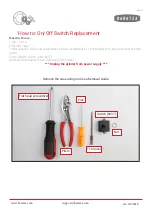
29
E N G L I S H
VERTICAL MITRE CROSS-CUT (FIG. 21)
1. Squeeze the mitre latch (m). Move the arm left or
right to the required angle.
2. The mitre latch will automatically locate at 0°, 15°,
22.5°, 31.62°, 45° and 50° both left and right. If any
intermediate angle is required hold the head fi rmly
and lock by fastening the mitre latch.
3. Always ensure that the mitre lock lever is locked
tightly before cutting.
4. Proceed as for a vertical straight cross-cut.
WARNING:
When mitring the end of a piece of
wood with a small off-cut, position the wood to
ensure that the off-cut is to the side of the blade
with the greater angle to the fence, i.e.:
left mitre, off-cut to the right
right mitre, off-cut to the left
BEVEL CROSS-CUTS (FIG. 18, 22)
Bevel angles can be set from 0° to 48° to the left. Bevels
up to 45° can be cut with the mitre arm set between zero
and a maximum of 45° mitre position right or left.
1. Loosen the bevel clamp handle (t) and set the bevel
as desired.
2. Set the override button (dd) if required.
3. Hold the head fi rmly and do not allow it to fall.
4. Tighten the bevel clamp handle (t) fi rmly.
5. Proceed as for a vertical straight cross-cut.
Quality of cut
The smoothness of any cut depends on a number of vari-
ables, i.e. the material being cut. When smoothest cuts
are desired for moulding andother precision work, a sharp
(60-tooth carbide) blade and a slower, even cutting rate
will produce the desired results.
WARNING:
Ensure that the material does not
creep while cutting; clamp it securely in place.
Always let the blade come to a full stop before
raising the arm. If small fi bres of wood still split
out at the rear of the workpiece, stick a piece
of masking tape on the wood where the cut will
be made. Saw through the tape and carefully
remove tape when fi nished.
Clamping the workpiece (fi g. 3)
1. Whenever possible, clamp the wood to the saw.
2. For best results use the material clamp (jj) made for
use with your saw. Clamp the workpiece to the fence
whenever possible. You can clamp to either side of
the saw blade; remember to position your clamp
against a solid, fl at surface of fence.
WARNING:
Always use a material clamp when
cutting non-ferrous metals.
Compound mitre (fi g. 23, 24)
This cut is a combination of a mitre and a bevel cut. This is
the type of cut used to make frames or boxes with slanting
sides like the one shown in fi gure 23.
WARNING:
If the cutting angle varies from cut
to cut, check that the bevel clamp handle and
the mitre clamping knob are securely tightened.
These must be tightened after making any
changes in bevel or mitre.
•
The chart shown below will assist you in selecting
the proper bevel and mitre settings for common
compound mitre cuts.
•
To use the chart, select the desired angle “A” (fi g. 24)
of your project and locate that angle on the appropri-
ate arc in the chart. From that point follow the chart
straight down to fi nd the correct bevel angle and
straight across to fi nd the correct mitre angle.
0
5
10
15
20
25
30
35
40
45
0
5
10
15
20
25
30
35
40
45
5
10
15
20
25
30
35
40
45
5
10
15
20
25
30
35
40
5
10
15
20
25
30
35
40
45
50
55
6
0
65
70
75
80
85
5
10
15
20
25
30
35
40
45
50
55
6
0
6
5
70
7
5
80
85
5
10
15
20
25
30
35
40
45
50
55
6
0
65
7
0
7
5
80
8
5
8 SIDED BOX
6 SIDED BOX
ANGLE OF SIDE OF BOX (ANGLE”A”)
SET
THIS MITER
ANGLE ON SA
W
SET THIS BEVEL ANGLE ON SAW
SQUARE BOX
1. Set your saw to the prescribed angles and make
a few trial cuts.
2. Practice fi tting the cut pieces together.
Example: To make a four-sided box with 25° exterior
angles (angle “A”) (fi g. 24), use the upper right arc.
Find 25° on the arc scale. Follow the horizontal
intersecting line to either side to get the mitre angle
setting on the saw (23°). Likewise follow the vertical
intersecting line to the top or bottom to get the bevel
angle setting on the saw (40°). Always try cuts on
a few scrap pieces of wood to verify the settings on
the saw.
WARNING:
Never exceed the compound mitre
limits of 45° bevel with 45° left or right mitre.
Support for short and long pieces (fi g. 3)
CUTING SHORT MATERIAL
It is advisable to use the length stop (ll) for short workpieces
both for batch sawing and for short individual workpieces
















































